The Buck Stops Here in Independence, MO!
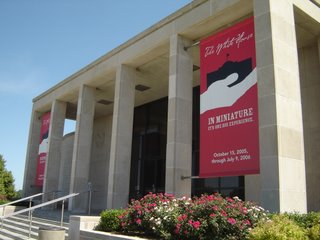 While touring Kansas City, MO, I visited the Harry S. Truman Presidential Museum and Library, located in nearby Independence, MO. Regular readers of my blog will know that I have visited a series of Presidential museums (Roosevelt, Johnson, Nixon, Carter, and Reagan), so this was a big treat. Unlike the previous places I’ve visited, however, this was the first time I arrived without a solid opinion on the person’s legacy. The truth is, that other than dropping the bomb on the Japs in World War II, I know very little about Truman and what he did in office. It turns out that the Truman presidency had a profound impact on the would I would grow up in about 30 years later.
While touring Kansas City, MO, I visited the Harry S. Truman Presidential Museum and Library, located in nearby Independence, MO. Regular readers of my blog will know that I have visited a series of Presidential museums (Roosevelt, Johnson, Nixon, Carter, and Reagan), so this was a big treat. Unlike the previous places I’ve visited, however, this was the first time I arrived without a solid opinion on the person’s legacy. The truth is, that other than dropping the bomb on the Japs in World War II, I know very little about Truman and what he did in office. It turns out that the Truman presidency had a profound impact on the would I would grow up in about 30 years later.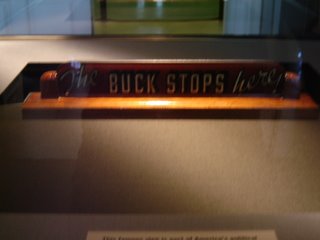 Truman was famous for the saying, "the Buck Stops Here," based on a plaque that sat on his desk while President. The saying has its roots in a contemporary term:
Truman was famous for the saying, "the Buck Stops Here," based on a plaque that sat on his desk while President. The saying has its roots in a contemporary term:The saying "the buck stops here" derives from the slang expression "pass the buck" which means passing the responsibility on to someone else. The latter expression is said to have originated with the game of poker, in which a marker or counter, frequently in frontier days a knife with a buckhorn handle, was used to indicate the person whose turn it was to deal. If the player did not wish to deal he could pass the responsibility by passing the "buck," as the counter came to be called, to the next player.
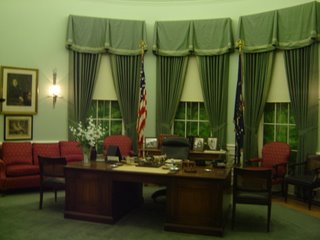 Like all of the previous presidential libraries I’ve been to, it features a replica of the Oval Office in which the subject served.
Like all of the previous presidential libraries I’ve been to, it features a replica of the Oval Office in which the subject served.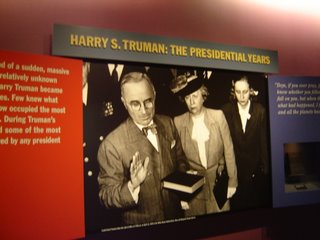 The museum tells its story mostly through photos and original documents. Since enough time has passed, quite a few of the articles on display were once highly classified.
The museum tells its story mostly through photos and original documents. Since enough time has passed, quite a few of the articles on display were once highly classified.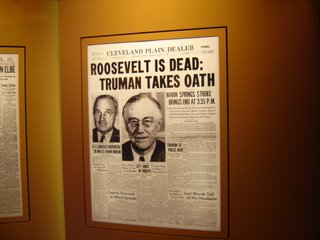 Truman served as vice president for only 82 days when Franklin Delano Roosevelt died. Truman would be faced with serious decisions right away, many of which molded the world we live in today.
Truman served as vice president for only 82 days when Franklin Delano Roosevelt died. Truman would be faced with serious decisions right away, many of which molded the world we live in today.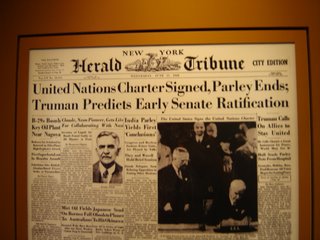 Newspaper headlines create an account of some of these major events, like the signing of the United Nations charter. I was surprised to learn that it was signed before Germany surrendered World War II. Years later I would go visit the U.N. in New York and write about it for this blog.
Newspaper headlines create an account of some of these major events, like the signing of the United Nations charter. I was surprised to learn that it was signed before Germany surrendered World War II. Years later I would go visit the U.N. in New York and write about it for this blog.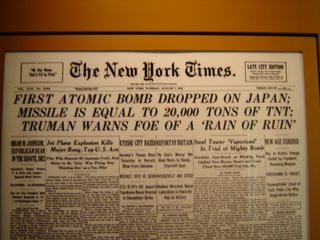 Truman’s most controversial decision would take place very early in his tenure: the one to drop the atomic bomb on Japan. It ushered in a new era of atomic power and raised the stakes in terms of the weapons of war. It clearly was not a decision made lightly.
Truman’s most controversial decision would take place very early in his tenure: the one to drop the atomic bomb on Japan. It ushered in a new era of atomic power and raised the stakes in terms of the weapons of war. It clearly was not a decision made lightly.Many would be against the move, including future president Dwight Eisenhower, quoted here:
"During his recitation of the relevant facts, I had been conscious of a feeling of depression and so I voiced to him my grave misgivings, first on the basis of my belief that Japan was already defeated and that dropping the bomb was completely unnecessary, and secondly because I thought that our country should avoid shocking world opinion by the use of a weapon whose employment was, I thought, no longer mandatory as a measure to save American lives. It was my belief that Japan was, at that very moment, seeking some way to surrender with a minimum loss of 'face'. The Secretary was deeply perturbed by my attitude..."
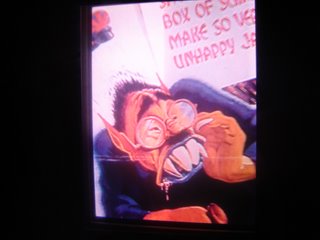 One of the most compelling exhibits, however, is a display of American propaganda against the Japanese.
One of the most compelling exhibits, however, is a display of American propaganda against the Japanese.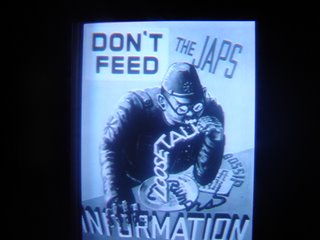 Some of the posters reminded me of similar work I saw in a museum in El Paso, TX.
Some of the posters reminded me of similar work I saw in a museum in El Paso, TX.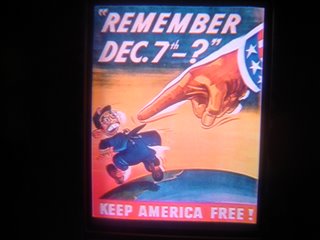 Others seemed very similar to things I might see today.
Others seemed very similar to things I might see today.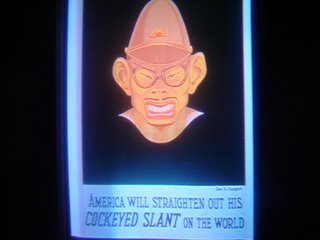 Additional images were so racist that they would not be tolerated today. Hopefully.
Additional images were so racist that they would not be tolerated today. Hopefully.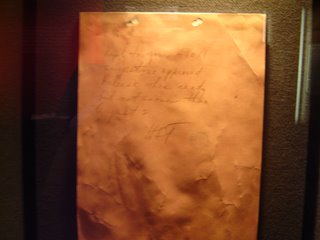 Interestingly enough, there exists no document that explicitly shows that Truman approved the use of an atomic bomb. The only thing that comes close is this hand written note that approves a public statement being made about the issue.
Interestingly enough, there exists no document that explicitly shows that Truman approved the use of an atomic bomb. The only thing that comes close is this hand written note that approves a public statement being made about the issue.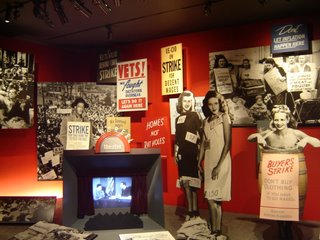 Truman’s post-war challenges were great. History books seem to skip from one major date to another, and due to this I’ve never heard of how hard the immediate post-war months were on Americans. The time brought with it high inflation, a slow de-deployment, and a struggle for the roles of women at home. Women, who had been working in factories doing the work normally done by men, were now told to become homemakers again. It must have been a very difficult transition, one that likely led to the women’s movement a generation later.
Truman’s post-war challenges were great. History books seem to skip from one major date to another, and due to this I’ve never heard of how hard the immediate post-war months were on Americans. The time brought with it high inflation, a slow de-deployment, and a struggle for the roles of women at home. Women, who had been working in factories doing the work normally done by men, were now told to become homemakers again. It must have been a very difficult transition, one that likely led to the women’s movement a generation later.Tensions built up so badly against Truman that he had a Bill Clinton-like midterm election loss in 1946 where the Republican party took control of congress for the first time since 1928. The GOP slogan was simply “had enough?”
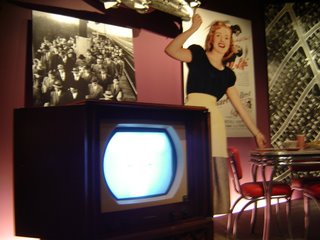 Things would get “better” in 1947 in a way that would transform the United States population in many ways that affect us today. It was this time period that Americans started to become consumers and suburbanites. Economic growth and prosperity grew at a pace not seen in at least 20 years. Things like televisions and air conditioners would become commonplace, much to the dismay of environmentalists today.
Things would get “better” in 1947 in a way that would transform the United States population in many ways that affect us today. It was this time period that Americans started to become consumers and suburbanites. Economic growth and prosperity grew at a pace not seen in at least 20 years. Things like televisions and air conditioners would become commonplace, much to the dismay of environmentalists today.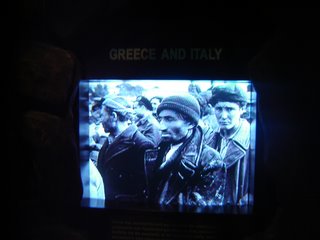 While things were going great in the United States, Europe was a disaster. War-torn Europe's economic underpinnings were almost totally demolished and rough weather conditions made things worse for the population. In 1947, tensions between the U.S./U.K. and its former ally the Soviet Union were growing.
While things were going great in the United States, Europe was a disaster. War-torn Europe's economic underpinnings were almost totally demolished and rough weather conditions made things worse for the population. In 1947, tensions between the U.S./U.K. and its former ally the Soviet Union were growing.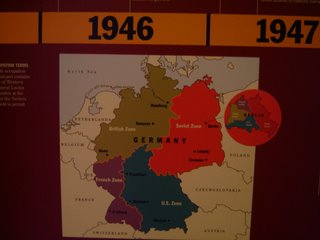 The Soviets wanted to prevent Germany from rising again a third time and began making moves to dominate Eastern Europe. The West resisted these moves, and the Cold War began to take shape. The Soviet Union began installing Communist governments in its occupied territory, ignoring pleas from the Western world that elections take place.
The Soviets wanted to prevent Germany from rising again a third time and began making moves to dominate Eastern Europe. The West resisted these moves, and the Cold War began to take shape. The Soviet Union began installing Communist governments in its occupied territory, ignoring pleas from the Western world that elections take place.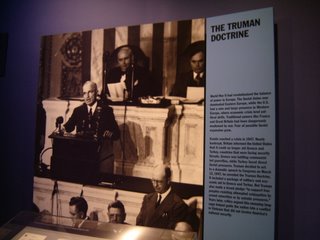 Economic conditions in Europe changed the balance of power in the area. The once dominant British Empire was near bankruptcy, and it began releasing itself from its imperial entanglements. One of the first moves in this area was announcing it would no longer provide financial assistance to Greece and Turkey, both of whom were facing pressure from Communist influences.
Economic conditions in Europe changed the balance of power in the area. The once dominant British Empire was near bankruptcy, and it began releasing itself from its imperial entanglements. One of the first moves in this area was announcing it would no longer provide financial assistance to Greece and Turkey, both of whom were facing pressure from Communist influences.President Truman decided to step in and his speech to congress was declared in history books as The Truman Doctrine and possibly the official start of the Cold War.
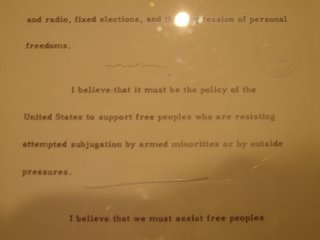 Truman boldly claimed:
Truman boldly claimed:I believe that it must be the policy of the United States to support free peoples who are resisting attempted subjugation by armed minorities or by outside pressures.
I believe that we must assist free peoples to work out their own destinies in their own way.
I believe that our help should be primarily through economic and financial aid which is essential to economic stability and orderly political processes.
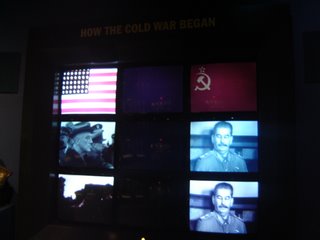 The Cold War was on. I would be born into this conflict and my worldview shaped by it. If not for this time, I never would have fallen in love with the movie Red Dawn. Nor would I think that Ronald Reagan was the greatest President of my lifetime (go ahead, flame away you Commie sympathizers).
The Cold War was on. I would be born into this conflict and my worldview shaped by it. If not for this time, I never would have fallen in love with the movie Red Dawn. Nor would I think that Ronald Reagan was the greatest President of my lifetime (go ahead, flame away you Commie sympathizers).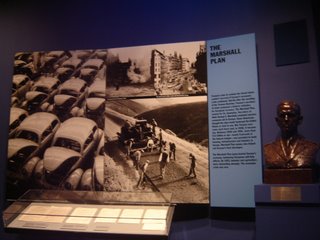 The U.S. government would enact this doctrine through the Marshall Plan, named after then Secretary of State George C. Marshall. The plan:
The U.S. government would enact this doctrine through the Marshall Plan, named after then Secretary of State George C. Marshall. The plan:The United States offered up to $20 billion for relief, but only if the European nations could get together and draw up a rational plan on how they would use the aid. For the first time, they would have to act as a single economic unit; they would have to cooperate with each other. Marshall also offered aid to the Soviet Union and its allies in eastern Europe, but Stalin denounced the program as a trick and refused to participate. The Russian rejection probably made passage of the measure through Congress possible.
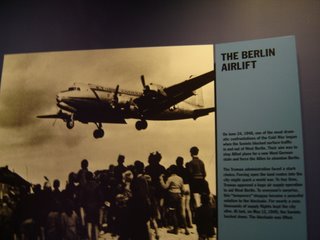 In a brief matter of time, the conflict between the West and the East began to escalate. The Soviets would blockade Berlin, and the West would respond with airlifts. The West created a military alliance called NATO to defend itself against a possible Soviet attack. Things were not developing nicely. The conflict established in this time period would go on until the 1990s. Interestingly enough, while NATO did get itself involved in conflicts (most notably Bill Cinton's decision to use the group to favor Muslims over Orthodox Christians in Bosnia and bomb them) treaty would only be used once in it's original context -- September 11 -- when the U.S. was attacked by Muslim terrorists.
In a brief matter of time, the conflict between the West and the East began to escalate. The Soviets would blockade Berlin, and the West would respond with airlifts. The West created a military alliance called NATO to defend itself against a possible Soviet attack. Things were not developing nicely. The conflict established in this time period would go on until the 1990s. Interestingly enough, while NATO did get itself involved in conflicts (most notably Bill Cinton's decision to use the group to favor Muslims over Orthodox Christians in Bosnia and bomb them) treaty would only be used once in it's original context -- September 11 -- when the U.S. was attacked by Muslim terrorists.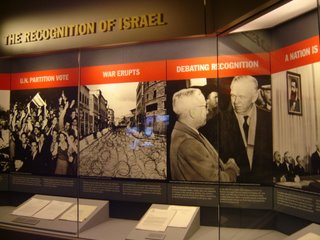 Then, if that wasn’t enough of a legacy for Truman, he decided to recognize Israel as a country, giving crazy Muslims an excuse to hate us and try to blow us up ever since. The museum is surprisingly frank about the decision, showing that a number of Truman’s advisors were against the movie. According to the museum, Truman appeared to do it for two reasons: he had sympathy for the Jews who had just been slaughtered in the Holocaust and he needed the Jewish vote for re-election.
Then, if that wasn’t enough of a legacy for Truman, he decided to recognize Israel as a country, giving crazy Muslims an excuse to hate us and try to blow us up ever since. The museum is surprisingly frank about the decision, showing that a number of Truman’s advisors were against the movie. According to the museum, Truman appeared to do it for two reasons: he had sympathy for the Jews who had just been slaughtered in the Holocaust and he needed the Jewish vote for re-election.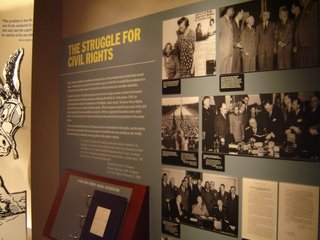 Truman wasn’t done. Nope. Not yet. He even tried to get some equality for black people in America. Bad idea. For him at least. He fractured the Democratic party in three (the liberals were mad at his hard line against the Soviets, the Southerners were mad at him over civil rights, and a third faction actually liked the guy).
Truman wasn’t done. Nope. Not yet. He even tried to get some equality for black people in America. Bad idea. For him at least. He fractured the Democratic party in three (the liberals were mad at his hard line against the Soviets, the Southerners were mad at him over civil rights, and a third faction actually liked the guy).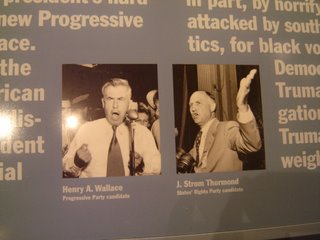 The split let to a candidacy of Strom Thurmond with the “States Rights Democratic Party,” one of the few third parties in American history to get electoral votes. Thurmond was banking on getting enough black votes to offset the white Southern vote.
The split let to a candidacy of Strom Thurmond with the “States Rights Democratic Party,” one of the few third parties in American history to get electoral votes. Thurmond was banking on getting enough black votes to offset the white Southern vote.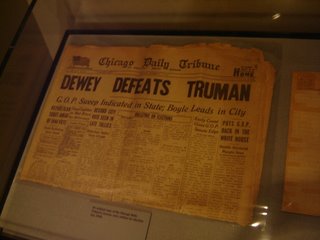 He just barely made it. In an improbable victory -- one which even the newspapers of the day could not predict -- Truman won re-election. The nation was lucky that Dewey wasn't like Al Gore and challenged the election due to the media declaring that he'd won, but that's a story for another museum.
He just barely made it. In an improbable victory -- one which even the newspapers of the day could not predict -- Truman won re-election. The nation was lucky that Dewey wasn't like Al Gore and challenged the election due to the media declaring that he'd won, but that's a story for another museum.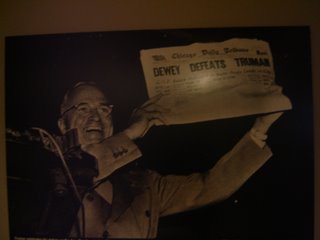 Truman was triumphant. There was little time to celebrate however, as things were about to get worse for the president and the country. In the Fall of 1949, the Soviets exploded their first atomic bomb and China declared itself as a Communist country.
Truman was triumphant. There was little time to celebrate however, as things were about to get worse for the president and the country. In the Fall of 1949, the Soviets exploded their first atomic bomb and China declared itself as a Communist country.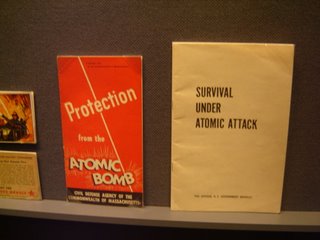 America braced itself for the worst.
America braced itself for the worst.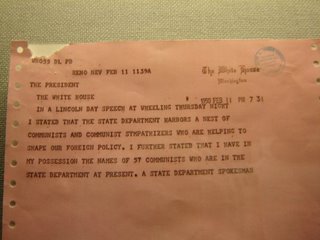 Republican Senator Joseph McCarthy (who is from Appleton, WI) began his quest to find Communists in the State department, sending a telegram to the president advising him of his coming actions. McCarthy was right about at least one State Department spy, Alger Hiss, who was convicted of perjury and later proven to be working for the Soviets. The Hiss case launched the political career of future president Richard Nixon, and angered some of the very same people who would chase him out of town in the late 1970s.
Republican Senator Joseph McCarthy (who is from Appleton, WI) began his quest to find Communists in the State department, sending a telegram to the president advising him of his coming actions. McCarthy was right about at least one State Department spy, Alger Hiss, who was convicted of perjury and later proven to be working for the Soviets. The Hiss case launched the political career of future president Richard Nixon, and angered some of the very same people who would chase him out of town in the late 1970s.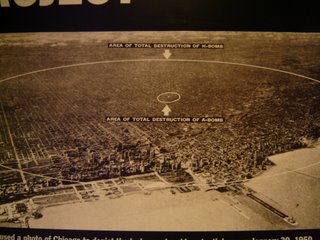 The arms race would intensify at Truman's lead. He authorized research to create a hydrogen bomb, one that was much more powerful than a simple atomic weapon.
The arms race would intensify at Truman's lead. He authorized research to create a hydrogen bomb, one that was much more powerful than a simple atomic weapon. Later on, he was presented with NSC-68, a top secret recommendation that encouraged the U.S. to dramatically increase its defense spending.
Later on, he was presented with NSC-68, a top secret recommendation that encouraged the U.S. to dramatically increase its defense spending.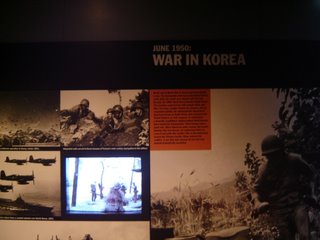 Truman resisted at first, the the Korean War -- another challenge faced by the President -- would change his mind.
Truman resisted at first, the the Korean War -- another challenge faced by the President -- would change his mind.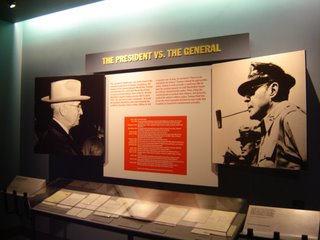 The war would cause conflict between the president and his top general, Douglas Macarthur. Macarthur wanted to bomb China in order to save Korea, but the president did not want another world war. When the general publically criticized his decision, President Truman fired him. The Korean War would end in a stalemate that still persists today.
The war would cause conflict between the president and his top general, Douglas Macarthur. Macarthur wanted to bomb China in order to save Korea, but the president did not want another world war. When the general publically criticized his decision, President Truman fired him. The Korean War would end in a stalemate that still persists today.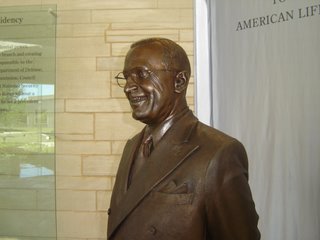 Truman would leave office with only a 30 percent approval rating. Only years later, with history as a cover, is he appreciated with greater enthusiasm.
Truman would leave office with only a 30 percent approval rating. Only years later, with history as a cover, is he appreciated with greater enthusiasm.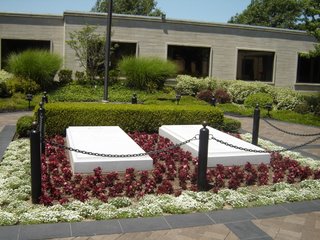 He and his wife are buried on the library grounds.
He and his wife are buried on the library grounds.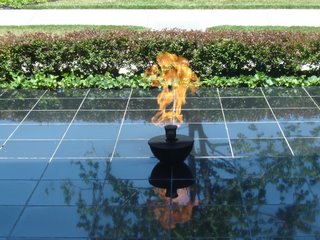 An eternal flame honors his service.
An eternal flame honors his service.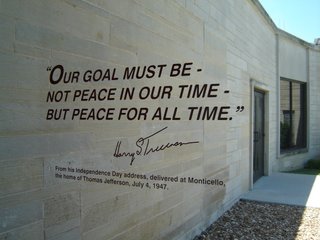 Now that I know what he had to face -- for better or for worse -- I have to honor him as well.
Now that I know what he had to face -- for better or for worse -- I have to honor him as well.RELATED LINKS:
Thinking through the bombing of Japan

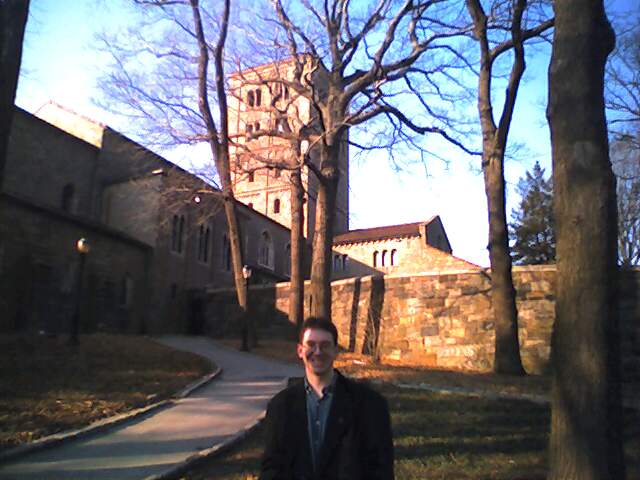

0 Comments:
Post a Comment
|<< Home